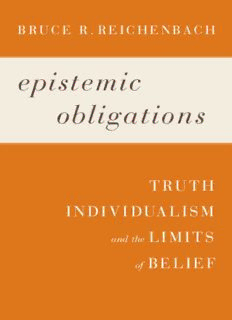
Epistemic Obligations: Truth, Individualism, and the Limits of Belief PDF
Preview Epistemic Obligations: Truth, Individualism, and the Limits of Belief
B r u c e r. re i c h e nBa c h e pi st e m i c obl i g a t i o n s T r u T h in d i v i d ua l i s m li m iTs and the B e l i e f of epistemic obligations This page intentionally left blank epistemic obligations Truth, Individualism, and the Limits of Belief Bruce R. Reichenbach Baylor University Press © 2012 by Baylor University Press Waco, Texas 76798-7363 All Rights Reserved. No part of this publication may be reproduced, stored in a retrieval system, or transmitted, in any form or by any means, electronic, mechanical, photocopying, recording, or otherwise, without the prior permission in writing of Baylor University Press. Cover Design by Natalya Balnova eISBN: 978-1-60258-625-3 (e-PDF) eISBN: 978-1-60258-797-7 (Mobipocket) This E-book was converted from the original source file by a third- party vendor. Readers who encounter any issues with formatting, text, linking, or readability are encouraged to notify the publisher at [email protected]. Some font characters may not display on older Kindle devices. To inquire about permission to use selections from this text, please contact Baylor University Press, One Bear Place, #97363, Waco, Texas 76798. Library of Congress Cataloging-in-Publication Data Reichenbach, Bruce R. Epistemic obligations : truth, individualism, and the limits of belief / Bruce R. Reichenbach. 284 p. cm. Includes bibliographical references (p. 263) and index. ISBN 978-1-60258-623-9 (hardcover : alk. paper) 1. Responsibility. 2. Belief and doubt. 3. Epistemics. I. Title. BJ1451.R45 2012 121’.6--dc23 2012007965 Printed in the United States of America on acid-free paper with a minimum of 30% post-comsumer waste recycled content. To my teachers, mentors, and colleagues Stuart Hackett, Arthur Holmes, Henry Veatch, Alvin Plantinga, William Alston, Larry Crockett, and Melville Stewart whose influence as Christian philosophers helped shape the ways I think and sharpened my philosophical ideas. This page intentionally left blank Contents Preface ix 1 The Challenge of Epistemic Obligations 1 2 Epistemic Obligations 29 3 Grounds for Epistemic Obligations 51 4 Epistemic Obligations and Justification 85 5 Belief Voluntarism 115 6 Belief 175 7 Epistemic Obligations and Accountability 213 Notes 243 Bibliography 263 Index 269 vii This page intentionally left blank Preface The other day I attended the reading of a paper with col- leagues from another department. The prediscussion turned to the question framed by my writing project: do we have a right to believe whatever we want? Without blinking an eye, one colleague replied that of course we have the right to believe whatever we wanted—so long as we do not hurt anyone else. The response was not unlike that given by many of my students when I posed the same question in class, and it accorded with the prevalent do-no-harm utilitarian ethic that predominates in popular culture. When I followed up her response with the question whether we had any obligations to believe the truth, she immediately responded that there was no truth. Her response piqued my curiosity. How, I wondered, did she grade her multiple-choice tests? If a student put down an answer and she marked it wrong, could not the student object to her evaluation on the grounds that there is no truth? The stu- dent, she replied, was under obligation to put down the correct answer in the context of the test. Whatever my col- league determined was correct was the answer to be placed on the test, regardless of the fact that there was no true ix
Description: